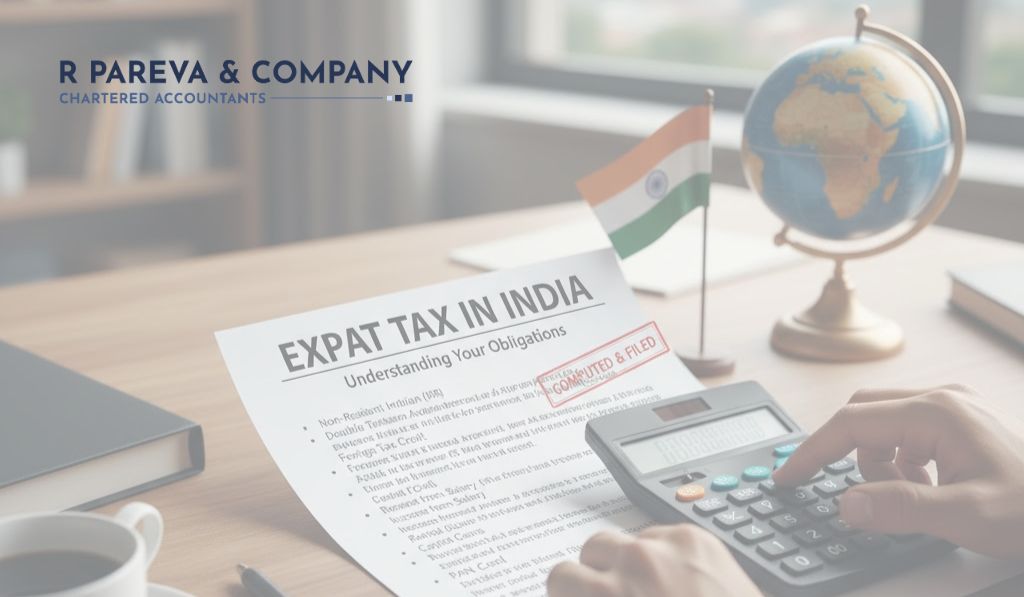India has become one of the most dynamic global destinations for professionals, entrepreneurs, and expatriates. As more foreign nationals live and work in India, understanding expat tax in India has become essential to ensure compliance with the country’s complex tax system. This comprehensive 2025 guide explains the fundamentals of expat taxation in India, covering residency rules, income tax implications, double taxation relief, and the importance of Expat Tax Advisory India and Expat Tax Compliance in India.
R Pareva & Company offers deep insights into these evolving tax regulations, ensuring expatriates and multinational employers remain compliant with Indian tax laws while optimizing their global mobility strategies through professional Expat Tax Services in India.
1. What Is Expat Tax in India?
Expat tax in India refers to the income tax obligations of foreign nationals (expatriates) who earn income while living or working in India. It covers salaries, allowances, bonuses, stock options, and other forms of compensation received during their stay in India.
The Indian Income Tax Act, 1961, applies to expatriates depending on their residential status, which determines how and to what extent their income is taxed in India.
2. Determining Residential Status for Expatriates
Understanding residential status is the cornerstone of expat taxation in India. The Indian tax system classifies individuals into three categories:
-
Resident and Ordinarily Resident (ROR): Global income is taxable in India.
-
Resident but Not Ordinarily Resident (RNOR): Only income earned in India or from a business controlled in India is taxable.
-
Non-Resident (NR): Only income received or accrued in India is taxable.
An expatriate’s residential status is determined based on the number of days spent in India during a financial year (April to March) and the preceding years. Typically, if an expatriate stays in India for 182 days or more in a financial year, they are considered a resident.
Accurate determination of residency status is crucial for Expat Tax Compliance in India, as errors can lead to incorrect tax filing and potential penalties.
3. Taxable Income for Expatriates in India
Once residency is established, the next step is to identify taxable income sources. The following categories generally apply to expatriates:
-
Salary Income: Wages, bonuses, allowances, and perquisites received for services rendered in India.
-
Perquisites: Employer-provided housing, car, education benefits, or relocation allowances.
-
Investment Income: Interest, dividends, or capital gains from Indian investments.
-
Foreign Income: Applicable if the expatriate is a resident and ordinarily resident (ROR).
Professional Expat Tax Advisory India can help assess these components accurately, ensuring compliance while leveraging available deductions and exemptions.
4. Tax Rates and Deductions
For the financial year 2025–26, expatriates are generally taxed at the same rates as Indian residents. The tax rates under the new regime range from 5% to 30%, depending on income slabs.
However, expatriates may also choose between the old and new tax regimes, based on which provides better tax benefits. Deductions under Sections 80C, 80D, 80G, and others can help reduce taxable income under the old regime.
A thorough evaluation by experts offering Expat Tax Services in India ensures expatriates select the most beneficial tax regime while maintaining full compliance.
5. Double Taxation Avoidance Agreement (DTAA)
One of the most critical aspects of expat taxation in India is the Double Taxation Avoidance Agreement (DTAA). India has DTAA treaties with over 90 countries to ensure that income earned by expatriates is not taxed twice — once in their home country and again in India.
Under the DTAA, relief can be claimed in two primary ways:
-
Exemption Method: Income is taxed only in one country.
-
Credit Method: Tax paid in one country is credited against the liability in the other.
Professional Expat Tax Advisory India services help expatriates claim DTAA benefits effectively, ensuring compliance and optimizing global tax exposure.
6. Social Security and Tax Implications
In addition to income tax, expatriates may also be subject to social security contributions under Indian law. However, India has Social Security Agreements (SSA) with several countries that exempt expatriates from double contributions.
Employers and employees should assess these obligations as part of their Expat Tax Compliance in India process to avoid unexpected liabilities.
7. Importance of Expat Tax Advisory India
Taxation laws governing expatriates are intricate and frequently updated. A professional Expat Tax Advisory India service ensures that both expatriates and employers understand their legal obligations, minimize tax risks, and optimize financial outcomes.
Advisory services typically include:
-
Residency status determination
-
Salary structure optimization
-
Tax-efficient planning for stock options and bonuses
-
Assistance with DTAA and SSA benefits
-
Filing income tax returns and managing assessments
R Pareva & Company, with its specialized expertise, provides comprehensive Expat Tax Services in India to help expatriates navigate these complexities confidently.
8. Expat Tax Compliance in India: Key Requirements
Ensuring Expat Tax Compliance in India involves adhering to various statutory obligations, including:
-
Obtaining a PAN (Permanent Account Number): Mandatory for tax filing.
-
Filing Annual Income Tax Returns: Generally due by 31st July each year.
-
Withholding Taxes (TDS): Employers must deduct taxes on salaries paid to expatriates.
-
Reporting Foreign Assets: Required for residents under Indian law.
-
Disclosing DTAA Benefits Claimed: Must be documented in the tax return.
Failure to comply with these requirements can lead to penalties, interest, or even prosecution. Therefore, professional guidance in Expat Tax Services in India is essential to ensure timely and accurate compliance.
9. Common Challenges Faced by Expatriates
Expatriates often encounter challenges such as:
-
Misunderstanding of residency rules
-
Incorrect tax withholding by employers
-
Double taxation due to misapplication of DTAA provisions
-
Lack of clarity on taxable perquisites and allowances
-
Delays in return filing or document submission
These challenges highlight the importance of engaging experienced professionals offering Expat Tax Advisory India to ensure smooth compliance and effective planning.
10. How R Pareva & Company Assists Expatriates
R Pareva & Company specializes in providing end-to-end Expat Tax Services in India, helping individuals and organizations manage cross-border taxation efficiently. Their expertise covers every stage of expatriate tax management — from onboarding and payroll structuring to return filing and dispute resolution.
The firm’s approach includes:
-
Tailored Expat Tax Advisory India for each client profile
-
Comprehensive support for Expat Tax Compliance in India
-
Assistance in claiming DTAA and SSA benefits
-
Guidance on tax optimization and expatriate financial planning
By integrating legal, regulatory, and practical aspects, R Pareva & Company ensures expatriates remain compliant while minimizing their tax liabilities in India.
Conclusion
As India continues to attract global talent, understanding expat tax in India has become more vital than ever. The complexities of expat taxation in India require careful planning, accurate compliance, and expert guidance.
Engaging professional advisors such as R Pareva & Company ensures expatriates receive comprehensive support across all aspects of Expat Tax Advisory India, Expat Tax Compliance in India, and Expat Tax Services in India. With the right strategy and professional insight, expatriates can meet their tax obligations confidently while optimizing their global financial position.

